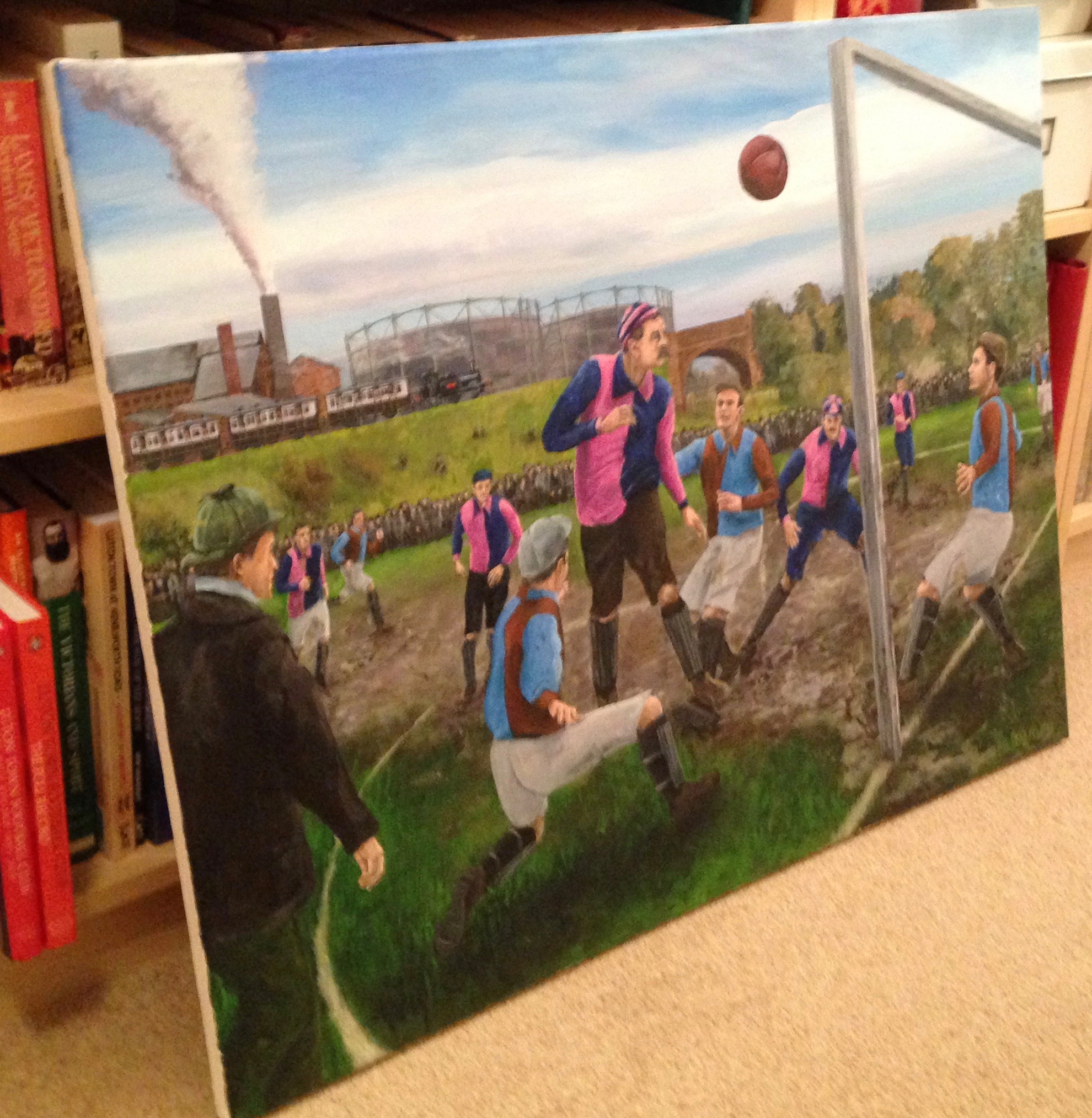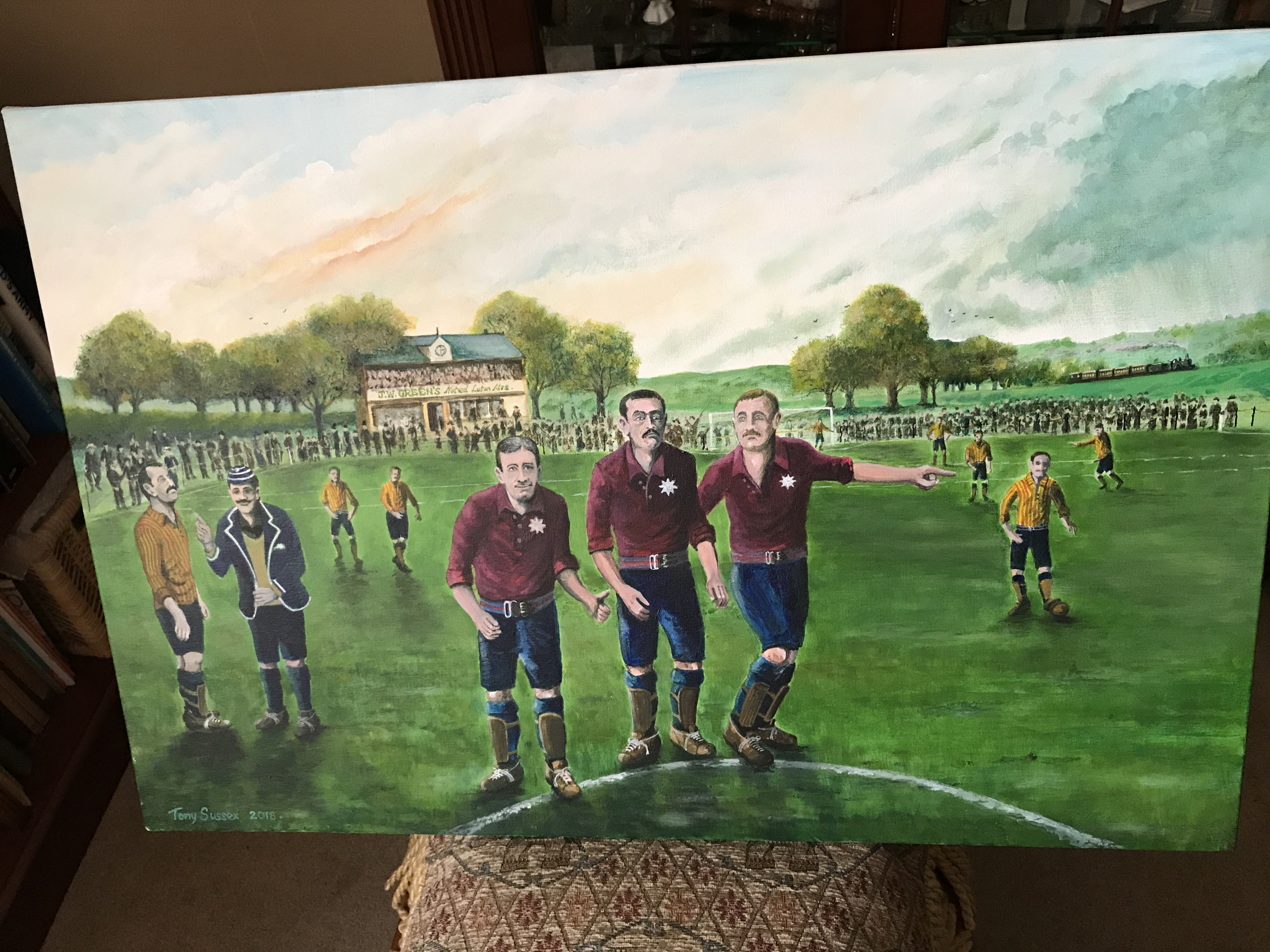Art
In 2015 I commissioned a painting from Luton artist, Andrew Naish in order to give a representation of football in 1885. I set the scene for Andrew in respect the kit, pitch markings and background and I left the rest to Andrew. The result is shown below.

It is an accurate recreation of Luton Town v Notts County played on the Dallow Lane ground, Luton on 7th November 1885. Luton won 2 0 in front of 2,000 spectators. As you look at the painting you are standing with your back to Dallow Lane with the Workhouse behind you. You are looking towards what is now the busway bridge over Dunstable Road. Sainsbury’s car park has replaced the gas holders. I chose this game because County were the first big club to come to the town. It also helped that we know the colours of County and that we won of course. Frank Whitby is in the forefront in the pink and blue shirt. All the football research I have done has come to life in the painting. In addition, I had to research other matters such as what 1885 gas holders looked like. The train is on the old line to Dunstable and there is a record of a Luton player missing an open goal because of smoke from a passing engine.
*******************************************************

“The Three Captains” by Tony Sussex. When I commissioned the painting I was quite specific in what I wanted so there was little artistic licence for Tony to get his teeth into. I am very grateful for his indulgence.
The scene shows the three captains on their way back after a goal has been scored against West Herts. As you look at the painting you have your back to the Dunstable Road. The railway line on the right is now the busway viewed towards Dunstable. The pavilion was paid for by J.W. Green, the brewer, at the cost of £50. It had seating on top and changing rooms and refreshments beneath (the atmosphere at games improved after the latter was installed).
The painting is an important one as it marks a crossroads in the early history of the club when three captain played in the same match. On the left is the star, captain and talisman of the early years, J.C. Lomax, who had drifted away from the club after his marriage in 1890. However, when he attended the funeral of John Long in Luton in the Summer of 1892 he briefly renewed his relationship with the club. He made a number of appearances early in the 1892/93 season.
In the centre, is J.W. Julian, the ex Royal Arsenal captain who had just arrived at Strawopolis. He had been ousted from the Royalists’ first team by an influx of Scottish and Northern players when they joined the Football League. His signing was a great coup for the Straw Plaiters and he acted as player coach. His efforts, and those of the club committee, helped launch the team from also rans into the top three in the south of England.
The third captain is the old warhorse, Arthur Taylor, who was appointed the club’s first permanent captain in September 1891. He was the first player to join the club from outside Luton – living and working in Bedford. He was a great leader of men, an athlete and had represented Bedfordshire alongside J.C. Lomax.
The match is set at Dallow Lane on the 1st October 1892 and the report below comes from the Luton Reporter of 8th October 1892. The opponents are West Herts who would merge with Watford St. Mary’s in 1898 to become Watford F.C..
“Luton Town v West Herts. This match, one of the most important of the town club’s list, was played on Saturday on the Athletic Ground. The organisations have been sturdy rivals in the past, and the fact that some of the recent engagements have produced very close finishes had the effect of creating an intense feeling of interest in the encounter. It would be remembered that last year the two matches were not unattended with considerable dissatisfaction. On the first occasion when the teams met at Luton the verdict was given against the home eleven by one goal, and the return at Watford the verdict was a draw. Both these decisions gave great umbrage to the supporters of the Luton men. On the present occasion a crowd numbering about 1,000 people lined the ropes, despite the fact that the charge for admission had been increased. The teams ranged up about 3.30 in the following order:- Luton Town: Goal, J. Burley; backs, A. Sanders and A. Hoy; half-backs, J.W. Julian (captain), A.H. Taylor and J. Wright; forwards, H. Barbour (centre) F.K. Whitby, H. Whitby (left), J.C. Lomax and R. Brown (right). West Herts: Goal, W. Baker; backs, C. Regan and J.R. Paull: half-backs, J. Penny, C.H. Peacock and A.J. Houghton; forwards, W.S. Coles (captain), (centre), R. Mills, R. Pell (right), T.W. Roach and C. Wheeler (left). The referee was Mr S.P.F. Moore (St. George’s School, Harpenden), and the linesmen were Messrs E.H. Merriotte and E. Barford. The Luton captain won the toss and Coles kicked off against the wind. A drenching shower of rain commenced to fall immediately after the start and continued for a considerable time. Barbour was the first man to distinguish himself by making a brilliant run. The Lutonians indeed went off with a great dash, and scarcely two minutes had elapsed from the start before F. Whitby scored in brilliant fashion after a free kick for “hands.” Barbour continued to make himself noticeable, and was copied by Julian, and it was not long before a “corner” fell to the Lutonians after a capital piece of play by the first-named. Lomax put in a first rate dodging run, but Regan averted the danger though he conceded a corner i doing so. Another similar point followed in rapid succession. The visitors next took a turn at attacking, and so close did they come to their enemies’ citadel on one occasion that Taylor kicked a ball over his own cross bar in order to avert the danger. West Herts., however, shortly afterwards opened their own account , Wheeler notching a point in very fine style. An admirable shot by H. Whitby was only kept out with difficulty, and it was noticeable that Coles and Barbour were playing in particularly fine form. The Luton men had been relaxing their efforts somewhat, but they now exerted themselves, and Brown narrowly escaped scoring after a pass by Barbour. Wheeler sent in an attempt which looked uncommonly close to a score, and Mills followed this with another. Julian missed by inches only and the next point of interest was a foul awarded against West Herts. The Lutonians were now getting the upper hand in an unmistakable way. Time after time they succeeded in working the sphere into the neighbourhood of Baker’s charge, and at length H. Whitby gave his side again the lead by means of a very fine low shot. Taylor missed only a yard, and H. Whitby was similarly unsuccessful a minute or so later. Some pretty passing by the Luton forwards had to be chronicled, and then through infractions of the rules both sides were visited by the usual penalties. At half-time the scores remained unaltered, the “reds” thus leading by two goals to one. Immediately after the resumption Luton pressed very hard, and Lomax missed scoring by inches only. A “corner” for West Herts was nugatory, and free kicks fell for both sides. Wright was playing a very fine game; indeed, he has scarcely ever played better. Sanders too, was exhibiting grand defence: he was to be seen in almost every scrimmage, and he emerged with “blushing honours thick upon him.” He was several times lavishly applauded. “Hands” against West Herts. was given in rapid succession, and it seemed as if Luton were now having much the best of matters, the game being exceedingly fast. For a considerable period the Lutonians kept the ball in their adversaries quarters, and it was not until very nearly half the second portion had elapsed when the visitors managed to get it very much over the half-way line. At length Coles succeeded in getting in close proximity of the home fortress, but he failed in a most unaccountable way when directly in front of the post. Mills sent the leather just over the cross bar. Some surprise was caused a few minutes later by an action of the referee. An appeal was made by the Lutonians when they were in a good position before their opponents’ goal line, and the referee, after apparently debating for a few moments threw up the ball – why, could not be ascertained. Very fine attempts by Brown and Julian were followed up by H. Whitby, who ten minutes before time arrived scored a magnificent goal. Brown put the ball through immediately afterwards, but the referee’s whistle had blown, and the point was accordingly disallowed. From this stage to the finish the game of was an exciting character. The visitors endeavoured strenuously to improve their position, but the defence of the homesters was so strong that they were unable to score again. The Lutonians, however, added to their total, Barbour doing the needful just on the point of time. The match thus ended in a win for the Town men by four goals to one. Amongst the home players deserving of credit were Sanders, whose defence was absolutely faultless, Julian, Wright and Barbour, while Brown at times did exceedingly good service. For West Herts. the right wing were most conspicuous, but the back division acquitted themselves very satisfactorily considering that the capabilities of the Luton forwards were never better shown than on this occasion.”

